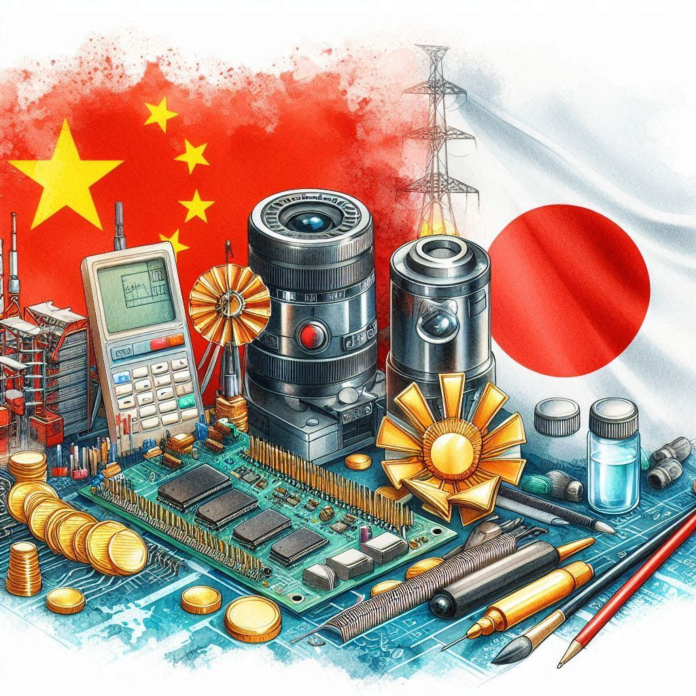In a tense stand-off, China has issued a stern warning to Japan, threatening severe economic retaliation if Tokyo further restricts the sale and servicing of chipmaking equipment to Chinese companies. This development complicates the United States’ ongoing efforts to cut China off from advanced technology, part of a broader strategy to curb China’s progress in the semiconductor industry.
The warning from China comes as Tokyo faces pressure from the United States to impose stricter controls on its semiconductor industry, particularly targeting companies like Tokyo Electron Ltd., which produce the advanced chipmaking tools China relies on. Senior Chinese officials have communicated this threat in recent meetings with their Japanese counterparts, signaling the serious economic consequences Japan might face if it aligns more closely with the US-led efforts.
One of the major concerns within Japan, particularly from automotive giant Toyota Motor Corporation, is that China could retaliate by restricting Japan’s access to critical minerals essential for automotive production. These minerals, including rare earth elements, are vital for the manufacture of various high-tech components, and a cut-off could severely impact Japan’s industry.
Historical Context and Industry Concerns
Japan’s concerns are not without precedent. In 2010, China temporarily suspended exports of rare earths to Japan following a territorial dispute in the East China Sea. The sudden move sent shockwaves through Japan’s electronics sector, which heavily depended on these minerals. This incident highlighted Japan’s vulnerability and sparked efforts to reduce its reliance on Chinese imports, though with mixed success.
China Warns EU Over EV Tariffs: Retaliates with Dairy Product Probe
Toyota, one of Japan’s most influential companies, has voiced its worries to officials in Tokyo. The automaker has significant stakes in the semiconductor industry, having invested in a new chip campus being built by Taiwan Semiconductor Manufacturing Co. (TSMC) in Kumamoto, Japan. This investment underlines Toyota’s deep involvement in the country’s chip policy, making its concerns particularly significant for Japanese officials.
The US has been pushing Japan to impose further restrictions on companies like Tokyo Electron, in line with a broader campaign to stymie China’s semiconductor advancements. As these talks progress, the US has been working with Japan on a strategy to ensure adequate supplies of critical minerals, particularly in light of China’s recent restrictions on the export of gallium, germanium, and graphite — materials crucial for semiconductor production.
Diplomatic Maneuvering and Tense Stand-off
While the Biden administration remains confident that it can address Tokyo’s concerns and reach an agreement by the end of the year, the situation is fraught with complications. The US has a powerful tool at its disposal known as the foreign direct product rule (FDPR), which allows it to control the sale of products made anywhere in the world, provided they use even a small amount of American technology. However, invoking this authority against Japan could strain relations between the two allies, which is why US officials have so far refrained from doing so.
The timing of any potential deal is also influenced by the political landscape in both the US and Japan. The upcoming US presidential election in November and the planned resignation of Japanese Prime Minister Fumio Kishida this month add layers of uncertainty. Despite these challenges, American officials believe that Tokyo has built a consensus for tighter controls across its government, which could help in finalizing the agreement but will create tense stand-off too.
Dutch Decision to Impose ASML Sanctions Could Be a Painful Blow to China’s Chip Industry
Meanwhile, China has firmly opposed what it sees as efforts by individual nations to politicize normal trade relations and lure other countries into a technology blockade against it. This stance underscores the broader geopolitical tensions at play, as China seeks to defend its access to critical technologies while the US and its allies attempt to limit it.
Current tense stand-off is the latest chapter in a long-running dispute over global semiconductor supply chains, which has seen the US, Japan, and the Netherlands imposing export controls aimed at limiting China’s technological advancements. The US first introduced sweeping chip export controls in October 2022, targeting both equipment and advanced processors. Japan and the Netherlands followed suit with their own measures, though these were less restrictive.
China Outsmarts US, Defies AI Chip Sanctions with Brazen Smugglers and Shell Companies
In recent months, the US has been engaged in a parallel set of negotiations with officials in Japan and the Netherlands, aiming to align them with potential new American measures. These could include additional restrictions on high-bandwidth memory chips, essential for artificial intelligence, and further curbs on chipmaking tools. The Biden administration is under pressure from US industry and lawmakers to secure an agreement with key allies before moving forward with these new controls.
The stakes are high, not only for the semiconductor industry but also for the broader global economy. Japan’s position as a key player in the technology supply chain, combined with its reliance on critical minerals from China, puts it in a particularly delicate position. This is the primary reason of tense stand-off between China and Japan. As the US continues its efforts to rally allies around its semiconductor strategy, the outcome of these negotiations will have far-reaching implications for the future of global technology trade.


